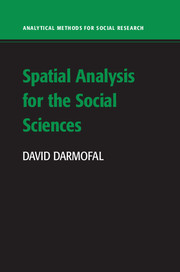Book contents
- Frontmatter
- Contents
- List of Figures
- List of Tables
- Preface
- PART I GENERAL TOPICS
- 1 The Social Sciences and Spatial Analysis
- 2 Defining Neighbors via a Spatial Weights Matrix
- 3 Spatial Autocorrelation and Statistical Inference
- 4 Diagnosing Spatial Dependence
- 5 Diagnosing Spatial Dependence in the Presence of Covariates
- 6 Spatial Lag and Spatial Error Models
- 7 Spatial Heterogeneity
- PART II ADVANCED TOPICS
- PART III APPENDICES ON IMPLEMENTING SPATIAL ANALYSES
- Glossary
- Bibliography
- Index
1 - The Social Sciences and Spatial Analysis
from PART I - GENERAL TOPICS
Published online by Cambridge University Press: 05 November 2015
- Frontmatter
- Contents
- List of Figures
- List of Tables
- Preface
- PART I GENERAL TOPICS
- 1 The Social Sciences and Spatial Analysis
- 2 Defining Neighbors via a Spatial Weights Matrix
- 3 Spatial Autocorrelation and Statistical Inference
- 4 Diagnosing Spatial Dependence
- 5 Diagnosing Spatial Dependence in the Presence of Covariates
- 6 Spatial Lag and Spatial Error Models
- 7 Spatial Heterogeneity
- PART II ADVANCED TOPICS
- PART III APPENDICES ON IMPLEMENTING SPATIAL ANALYSES
- Glossary
- Bibliography
- Index
Summary
“[F]ull information should be given as to the degree in which the customs of the tribes and races which are compared together are independent. It might be, that some of the tribes had derived them from a common source, so that they were duplicate copies of the same original. …It would give a useful idea of the distribution of the several customs and of their relative prevalence in the world, if a map were so marked by shadings and colour as to present a picture of their geographical ranges.”
Sir Francis Galton at The Royal Anthropological Institute, 1888 The Journal of the Anthropological Institute of Great Britain and Ireland 18: 270.INTRODUCTION
Concepts of space and geography play prominent roles in many social science theories. In fields as diverse as anthropology, criminology, demography, political science, sociology, and public health, our theories predict that spatially proximate units are more likely to behave similarly than spatially distant units. These theories, in short, predict positive spatial autocorrelation or spatial dependence, the spatial clustering of similar behaviors, processes, and events among neighboring observations. This common interest in geography across the social sciences is not surprising. The social sciences are defined by their focus on phenomena that are inherently social and interdependent. Shared concerns combine with spatial proximity to promote familiarity. This familiarity in turn breeds both contempt and conflict and interaction and interdependence.
Until recently our ability to incorporate the spatial dimension of our theories in our models was quite limited, relying primarily on dummy variables to capture differences in behavior across geographically disparate units. Such an approach is suboptimal, as it is unable to address some of the central issues posed by spatially dependent data. Consider, for example, Sir Francis Galton's comment in the epigraph to this chapter. Sir Galton's comment in response to Edward Tylor's presentation at the Royal Anthropological Institute in November 1888 clearly ranks among the most influential comments expressed at an academic presentation, remembered as it is more than a century later. Sir Galton's critique, which has since come to be known as Galton's problem, focuses on the critical substantive distinction between two alternative explanations for spatially dependent behavior.
- Type
- Chapter
- Information
- Spatial Analysis for the Social Sciences , pp. 3 - 9Publisher: Cambridge University PressPrint publication year: 2015



